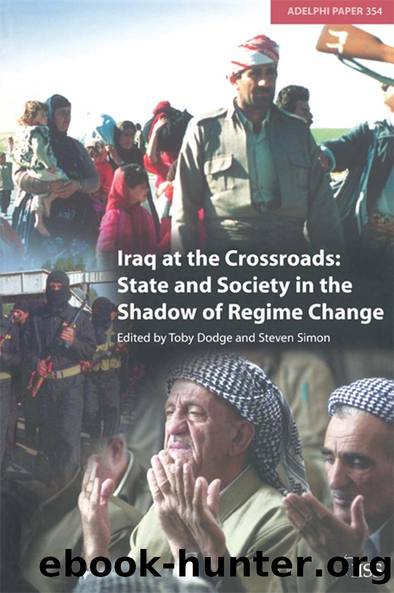Iraq at the Crossroads by Toby Dodge

Author:Toby Dodge [Dodge, Toby]
Language: eng
Format: epub
Tags: Nonfiction, History, Military, Strategy, Social & Cultural Studies, Political Science
ISBN: 9781136053207
Google: 689PzQEACAAJ
Publisher: Taylor and Francis
Published: 2013-06-17T04:00:00+00:00
Chapter 5
Saddam's Power Structure: the Tikritis Before, During and After the War
Amatzia Baram
Origins
Economic and social factors dominated the selection of the first generation of Iraqi army officers. They tended to hail from Baghdad and Mosul. They started their careers at the military school in Baghdad established in 1870 by the Ottoman governor Midhat Pasha. To be able to attend the school, which was free of charge, a child either needed to have family in the city where he could stay overnight, or his parents had to pay for his upkeep if they lived outside of Baghdad. The child also had to have a good basic education before he entered the military school. Families from the small provincial towns could not afford these expenses. The result was that when Iraq became a state in 1920, the available reservoir of officers, people who had served in the middle to upper ranks of the Ottoman army, came mainly from the middle classes of Baghdad and Mosul. The majority of the population of Basra could not join the Ottoman officer corps because they were Shia.
In the aftermath of the collapse of the Ottoman Empire (under King Faisal 11921â33), some officers remained in the armed forces, while others retired or turned to politics. They came to be known as the Sharifian officers, because they served the Sharifi Hashemite royal family which King Faisal I represented. These officers belonged to two very different groups. One consisted of officers who defected from the Ottoman army during the First World War to join the rebellious army of King Faisal's father, Sharif Hussein of Mecca, as well as officers who had been captured by the British and were offered the choice of fighting with the rebels or remaining in prison. Most of them chose release. Almost all these officers, who had fought alongside Faisal against the Ottomans, remained loyal to him and to the British, throughout their military and political careers. The Iraqi officers who fought in the Ottoman army against the British until the bitter end, were an entirely different group. Even though they eventually joined the administration of the new king in Baghdad, they remained a reservoir from which the most bitter enemies of the Hashemite monarchy and the British emerged. Very few members of either group came from the countryside.
The transformation of Iraq's economy and society that began in the 1930s brought about important changes in the composition of the officer corps. Young men from small towns in the SunniâArab triangle (BaghdadâMosulâJazira), and above all, from Tikrit, started to permeate the officer corps. There were two reasons for this: Tikrit's main industry, the kalak, a small boat made of animal skins, had become obsolete. The young generation that had depended on the kalak industry were now looking for new economic opportunities. Many went to Baghdad's teaching college, while others chose military service. Some, such as Saddam Hussein's maternal uncle and childhood friend, Ahmad Hasan al-Bakr, who later became the president of Iraq, first became teachers and
Download
This site does not store any files on its server. We only index and link to content provided by other sites. Please contact the content providers to delete copyright contents if any and email us, we'll remove relevant links or contents immediately.
Understandable Statistics. Concepts and Methods by Charles Henry Brase Corrinne Pellillo Brase Jason Dolor James Seibert(157)
Meat Less: The Next Food Revolution by David Julian McClements(151)
ASTROPHYSICS FOR NON-MATHEMATICIANS by Unknown(146)
Fundamentals of Physics I by R. Shankar;(136)
Modern Physics by Gary N. Felder and Kenny M. Felder(136)
Sensory Ecology, Behaviour, and Evolution by Stevens Martin;(123)
Calculus - Single and Multivariable 6th ed. by D. Hughes-Hallett(121)
A Brief Introduction to Classical Mechanics with Illustrative Problems (181 Pages) by Shahen Hacyan(118)
The Parrot in the Mirror by Antone Martinho-Truswell(117)
A History of Mathematical Impossibility by Lützen Jesper;(116)
Practical Math Success in 20 Minutes a Day by Mark A. McKibben(115)
Iraq at the Crossroads by Toby Dodge(109)
Probabilistic Risk Analysis and Bayesian Decision Theory by Marcel van Oijen & Mark Brewer(109)
B. Everitt (ed.) Encyclopedia of Statistics in Behavioral Science by Volume-2(103)
Flashes of Brilliance by Ronald L. Holle & Daile Zhang(100)
Chemistry for the IB Diploma Third edition by Christopher Talbot Chris Davison(100)
Ethnobotany by Jose L. Martinez(99)
Principles of Modern Chemistry by David W. Oxtoby H.P. Gillis & Laurie J. Butler(98)
B. Everitt (ed.) Encyclopedia of Statistics in Behavioral Science by Volume-3(97)
